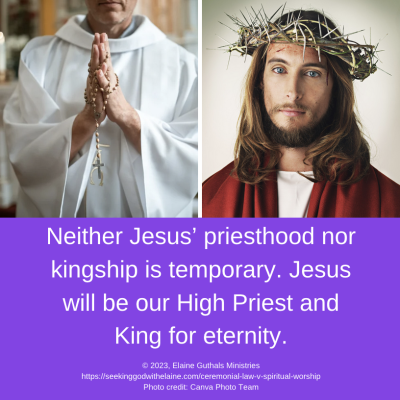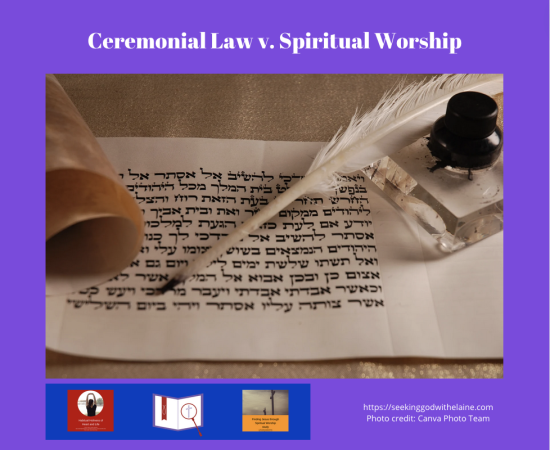The Jews in first-century Israel were all about the ceremonial law. This devotional reading begins to look at the differences between ceremonial law and spiritual worship.
Nuggets
- Spiritual worship doesn’t follow the requirements of ceremonial law.
- Spiritual worship requires a change of reliance.

There were many ceremonial laws given to Moses in the Torah, the first five books of God’s Word. They pertained to festivals, priests, and sacrifices.
Disciples today do not have to follow these laws. Charnock told us why. He wrote, “The ceremonial law was abolished to promote spirituality of worship.”
Resource
- Jesus was the Sacrifice, negating the need for any other.
- God comes to us individually through His Holy Spirit, eliminating the need for an intermediary.
The ceremonial law, while it brought cleansing, did not bring atonement. “For that old system deals only with food and drink and various cleansing ceremonies — physical regulations that were in effect only until a better system could be established” (Heb. 9: 10 NLT).
God didn’t want a stopgap anymore. His motive was, as Guyse wrote, “… to establish a more pure and spiritual worship and government …” It allows our motivations to be more pure and less sinful, strengthening our desire to be made like Him.
Resource
Let’s look at what verses in God’s Word used to explain why spiritual worship replaced ceremonial law. This review is going to take two devotions.
Let's Put It into Context
To read devotions in the Habitual Holiness of Heart and Life theme, click the button below.
Here is a running list of nuggets for the theme.
Devotions in the Finding Jesus through Spiritual Worship study
Here is a running list of nuggets for the study.
The foundation of this series is Menander and Charnock’s Spiritual Worship.
Resource
New Requirements
“Jesus became a priest, not by meeting the physical requirement of belonging to the tribe of Levi, but by the power of a life that cannot be destroyed” (Heb. 7: 16 NLT)
Spiritual worship doesn’t follow the requirements of ceremonial law.
If we look at the genealogy in Matthew 1, we quickly run into a problem. Matthew 1: 2 indicates that Jesus sprang from the tribe of Judah, not Levi.
What’s the big hairy deal about that? “But appoint the Levites over the tabernacle of the testimony, and over all its furnishings, and over all that belongs to it …” (Num. 1: 50 ESV).
Tribe of Levi, not Judah. Priests weren’t supposed to come from the tribe of Judah (Heb. 7: 14).
Edwards argued that this meant there was a shift in the tribe of priests. He wrote, “The commandment that constituted Aaron priest has not indeed been violently abrogated; [but] it was thrust aside in consequence of its own inner feebleness and uselessness. It has been lost, like the light of a star, in the spreading ‘dawn’ of day.” The priesthood was being transferred to Judah.
Resource
I can see this. The covenant of Abraham was replaced by the covenant of Jesus, providing the opportunity for the switch. Smith gave the reason as Judah being not only one of the strongest tribes, but also only one of two tribes who remained faithful to the house of David.
To read a related devotion, click the button below.
Glossary
Resource
Jesus was chosen to be praised because of His qualifications. Regardless of his lineage, He was, and will always be the only one who is pure enough to be a priest.
I can also see a second shift. “But you are a chosen race, a royal priesthood, a holy nation, a people for his own possession, that you may proclaim the excellencies of him who called you out of darkness into his marvelous light” (I Pet. 2: 9 ESV).
We, too, are now priests.
I know. We don’t feel qualified to be priests.
Title reminded us that priests were not chosen because of their gifts. They were chosen because they knew they didn’t have those gifts.
Resource
Sounds familiar, doesn’t it? Some may have felt that they did not possessed what it took to be a priest. God chose them anyway.
God chooses us based on our faithfulness to Him. Then He equips us for service.
“Now may the God of peace — who brought up from the dead our Lord Jesus, the great Shepherd of the sheep, and ratified an eternal covenant with his blood — may he equip you with all you need for doing his will. May he produce in you, through the power of Jesus Christ, every good thing that is pleasing to him. All glory to him forever and ever! Amen” (Heb. 13: 20-21 NLT).
Paul was praying for us, too. He just didn’t know it at the time.
Title also said something else really interesting. He said Jesus was chosen to be priest because this was what was in Him.
Think about it. Yeah, the 100% God part remained pure. It was Jesus’ choice that the 100% Man part did also.
We are called to choose God daily. “Then he said to the crowd, ‘If any of you wants to be my follower, you must give up your own way, take up your cross daily, and follow me’” (Lk. 9: 23 NLT).
Melchizedek’s name is also floated around. Remember, he was the king and priest that blessed Abraham in Genesis 14: 18-20. Jesus, too, is a Priest and King.
Spiritual worship can only replace the ceremonial law because Jesus is the Lord of lords and King of kings.
Neither Jesus’ priesthood nor kingship is temporary. Jesus will be our High Priest and King for eternity. That means our spiritual worship will never end.
When the writer of Hebrews wrote, “… the power of a life that cannot be destroyed” (Heb. 7: 16 NLT), Ker said that wasn’t talking about Jesus’ previous life in Heaven. He said it was taking about Jesus always being our mediator.
I like how Ker described the power. He wrote, “The words mean an indissoluble or indestructible life, safe against the assault of all enemies, and secure from all decay, or possibility of diminution.”
Resource
Nothing is going to be successful against that power! What hope that brings us!!!
Change can be a good thing. We have to not hold onto the old ceremonial law when the new spiritual worship offers so much more.

New Lives
“How foolish can you be? After starting your new lives in the Spirit, why are you now trying to become perfect by your own human effort?” (Gal. 3: 3 NLT)
Spiritual worship requires a change of reliance.
We’ve talked several times about becoming new creations when we submit to God. “This means that anyone who belongs to Christ has become a new person. The old life is gone; a new life has begun!” (II Cor. 5: 17 NLT).
Glossary
Included in that different way of seeing ourselves is the change in priorities. We are to focus on God rather than ourselves.
It would be horrible for us to start this new life of faith and spiritual privilege and keep hold of the old way of life.
The King James Version translates the end of the verse this way: “… are ye now made perfect by the flesh?” The flesh is our human, sinful nature.
We are looking to God but holding on to our old way of doing things.
God doesn’t want us to rely on ourselves any more than He wanted us to rely on the ceremonial law for salvation.
Paul had two other great verses in the letter to the Galatians.
- “So now that you know God (or should I say, now that God knows you), why do you want to go back again and become slaves once more to the weak and useless spiritual principles of this world?” (Gal. 4: 9 NLT).
- “When you follow the desires of your sinful nature, the results are very clear: sexual immorality, impurity, lustful pleasures” (Gal 5: 19 NLT).
God wants to get us out of that terrible situation and into His love and protection.
Ceremonial law is still law, and the law will not gain us salvation. We can only come to salvation through Jesus Christ.
To read a related devotion, click the button below.
We shouldn’t think we can rely on ourselves more than we can on God. He is all-knowing, all-seeing, and all-powerful. He will never leave us.
It should be our choice to focus on Him. “Trust in the Lord with all your heart; do not depend on your own understanding” (Prov. 3: 5 NLT).
We are blown every which way by circumstances. God never changes. We can rely on Him to see us through whatever life throws our way.
Holding onto self-reliance rather than fully embracing spiritual worship is not good. We have to be totally submitted to and truly worshiping Him.

Making the Connections #1
Sometimes, disciples are like first-century Jews. We like the name children of God as much as they liked God’s chosen people. They liked all the entitlements they thought came with it.
Glossary
Truth be known, so do we.
But really, we, they, and non-believers all are sinful. Children of God have just asked God to forgive them of their sins and submit their lives to them.
Making the Connections #2
The first-century Jews thought their ceremonial law was enough for salvation. God didn’t want their outward obedience alone. He wanted their inward transformation to holiness.
God wants the same for us.
The ceremonial law may not have been able to provide salvation, but God’s moral law perfects us. We need it for the Sanctification Road.
Salvation is the gift of life through the deliverance from condemnation and sin to acceptance and holiness and changes us from being spiritually dead to spiritually alive.
- Sin is not believing that Jesus is our Savior to save us from our actions by humans that disobey God and break one of His reasonable, holy, and righteous laws and commandments, goes against a purpose He has for us, or follows Satan’s promptings.
- Holy means to be set apart — because of our devotion to God — to become perfect, and morally pure while possessing all virtues and to serve and worship God.
- Perfection means we reach a state of maturity because the combination of the spiritual graces form, when all are present, spiritual wholeness or completeness — holy, sanctified, and righteous.
- Spiritual graces are worldly morals that have been submitted to God to further His kingdom instead of enhancing this world.
- Sanctified means to be set free from sin.
- Righteous means we are free from sin because we are following God’s moral laws.
- Pure means not being sinful or having the stain of sin.
- Virtues are standards of moral excellence.
- Perfection means we reach a state of maturity because the combination of the spiritual graces form, when all are present, spiritual wholeness or completeness — holy, sanctified, and righteous.
- Holy means to be set apart — because of our devotion to God — to become perfect, and morally pure while possessing all virtues and to serve and worship God.
- Holiness is the transcendent excellence of His nature that includes elements of purity, dedication, and commitment that lead to being set apart.
- Purity means possessing God’s moral character, having eliminated the stain of sin.
- Spiritual death is the spiritual separation from God that occurred as a consequence of Adam and Eve’s original sin.
- The spiritually alive are those who have ABCDed, so they are no longer separated from God.
Sanctification is the transformational process of the mind, body, and soul, which begins with regeneration; gradually changes our nature and morals through the promptings of the Holy Spirit; and ends with perfected state of spiritual wholeness or completeness.
- Regeneration is being changed from spiritually dead to spiritually alive and the internal new birth and requickening that God brings about through the work of the Holy Spirit to give us new character.
The ABCDs of Salvation
If you have not become a believer in Christ, please read through the
Plan of Salvation and prayerfully consider what God is asking you to do.
A – admit our sins
B – believe His Son Jesus is our Redeemer
C – confess God as Sovereign Lord
D – demonstrate that commitment by making any changes needed in our lives to live the way in which God has called us
The Disciple’s Job Description
Glossary
How Do We Apply This?
- Grow our recognition that the world needs Jesus and fulfill the Great Commandment to spread His gospel to all creatures.
- Pray constantly that God Will transform us on the Sanctification Road.
- Grow to have Jesus’ heart and sympathy.
- Understand we grow to be more like Him through our labors.
- Cultivate our patience to be like Christ’s.
- Increase God’s joy present in our lives through self-sacrifice.
- Start with the end in mind and continue as we started.
Resource
Father God. Thank You for sending Your Son to be our Savior when the ceremonial law was not enough to save us. Help us to obey Your moral law to aid us on the Sanctification Road. Amen.
What do you think?
Leave me a comment below (about this or anything else) or head over to my Facebook group for some interactive discussion.
If you don’t understand something and would like further clarification, please contact me.
If you have not signed up for the email providing the link to the devotions and the newsletter, do so below.
If God has used this devotion to speak with you, consider sharing it on social media.